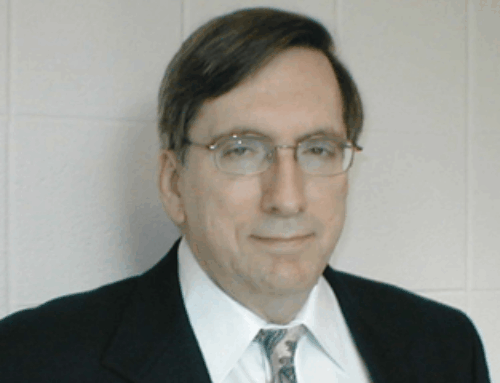Dear Colleague,
The American Academy of Sleep Medicine (AASM) Board of Directors met in San Diego on the weekend of January 26-28, 2007, for our third meeting of the 2006-2007 year. We spent the weekend discussing important issues facing our society, profession and field, as well as carefully examining factors that will affect our future.
We had a very productive meeting and I would like to share some actions with you, the membership, so you are aware of the direction the AASM is taking, especially regarding issues important to your practice.
New Scoring Manual to Debut in Spring; AASM Accredited Centers and Laboratories Must Introduce New Scoring Rules by January 2008
Thanks to the tremendous effort of the Task Forces, Steering Committee, and Editor Con Iber, The AASM Manual for the Scoring of Sleep and Associated Events: Rules, Terminology, and Technical Specifications is ready for publication. The review papers will be published in an upcoming issue of the Journal of Clinical Sleep Medicine, and the rules will be published as a free-standing monograph available in April/May 2007.
The Board of Directors also decided that American Academy of Sleep Medicine-accredited sleep centers and laboratories will be required to use the new scoring rules by January 2008. We believe that this will provide ample time for changes to procedures and education of staff. The AASM will assist in this process with multiple educational offerings.
American Sleep Medicine Foundation (ASMF) Portable Monitoring Grant
The American Academy of Sleep Medicine (AASM) continues to take a proactive stand on the important issue of portable monitoring. As you know, for the last several months the American Sleep Medicine Foundation (ASMF) has advertised an RFP for a multi-center, controlled study on portable monitoring for the diagnosis of OSA. I am pleased to announce that a large number of applications have been received. Currently an independent scientific panel is reviewing these applications, and the successful proposal will be selected soon. A final decision is expected in April 2007.
New Standards of Practice Parameters
The Board of Directors approved the development of two new standards of practice parameters, “Practice Parameter for the Indications of Polysomnography and Related Procedures in Children,” and “Practice Parameter for the Treatment of Obstructive Sleep Apnea in Adults: The Efficacy of Surgical Modifications of the Upper Airway.” Development of these new parameters follows publication of “Practice Parameter for the Use of Actigraphy in the Assessment of Sleep and Sleep Disorders: An update for 2006” in the April issue of SLEEP. The Board of Directors also mandated that the Standards of Practice Committee add the topic of pharmacological management of insomnia to its list of parameters to be developed in the future.
Update on Clinical Guidelines
In July 2007 the Board of Directors established Clinical Guidelines as a new tool for the field, and selected the first topic, “Clinical Guideline for the Evaluation and Management of Chronic Insomnia in Adults.” In October the Board added a second topic for address, “Clinical Guideline for the Evaluation, Management and Long-term Care of Obstructive Sleep Apnea in Adults.” The task forces for both clinical guidelines have made excellent progress, and the first guidelines are expected to be published later in 2007.
AASM Addresses Pay-for-Performance
The issue of pay-for-performance is becoming increasingly important in medicine, with Congress recently passing legislation providing for increased reimbursement for physicians treating Medicare patients who show outcome measures. With the help of federal funding, the American Medical Association (AMA) has convened the Physician Consortium for Performance Improvement to develop performance measures for physicians. Further, Centers for Medicare and Medicaid Services (CMS) in November released a list of 86 quality measurers for addition to the Physician Voluntary Reporting Program (PVRP) for 2007, and the Ambulatory Quality Alliance (AQA) adopted 26 performance measures for use by public and private health plans.
Although the time, course and exact process for the introduction of these measures remain uncertain, the American Academy of Sleep Medicine (AASM) is taking a proactive stand. The AASM is a voting member of the Physician Consortium and has actively participated in the review and approval of performance measures. Under the direction of Patrick Strollo, MD, the AASM has developed a quality performance measure set for adult obstructive sleep apnea. We are beginning the process of having these measures accepted by the Physician Consortium and then will start to develop more measure sets related to other aspects of sleep medicine.
NHLBI Strategic Plan
As you may have read in the Weekly Update, the National Heart, Lung, and Blood Institute (NHLBI) posted a draft version of its Strategic Plan online for public review and comment, and specifically requested input from the American Academy of Sleep Medicine (AASM). According to the NHLBI Web site, the principal focus of the plan is on conceptual approaches guiding an overall biomedical research strategy, and not on the identification/enumeration of individual disease states.
The Board of Directors reviewed the draft plan and commended the NHLBI for taking a comprehensive look at its scientific direction and creating an operational blueprint for the future. The Board suggested areas, especially related to the influence of environmental factors on health and disease, where mention of sleep and sleep disorders would enhance the plan.
According to the NHLBI, its Strategic Plan will be complete this spring and posted on the NHLBI Strategic Plan Web site.
AASM Advocacy: PAC Contributions
The American Academy of Sleep Medicine (AASM) has been the voice in Washington, D.C., for sleep medicine practitioners through advocacy efforts, political education and the political action committee (PAC).
The AASM PAC has efficiently distributed the contributions received from members to political candidates who are champions of the sleep medicine field, the medical community and the National Institutes of Health. For 2007 the AASM will again support members of the House of Representatives and Senate who are members of committees and subcommittees that may favorably impact medicine and practice. The Board has developed policies to identify members to be supported, based on their prior support for the field or their expressed views on health care and medical research.
Below is a list of representatives who will receive contributions this year:
Senate
Ben Cardin, D-Md.
Bob Corker, R-Tenn.
John Ensign, R-Nev.
Orin Hatch, R-Utah
Jon Kyl, R-Ariz.
House of Representatives
David Camp, R-Mich.
Nathan Deal, R-Ga.
Rosa L. DeLauro, D-Conn.
Lloyd Doggett, D-Texas
Bart Gordon, D-Tenn.
Ralph Hall, R-Texas
Nita M. Lowey, D-N.Y.
Charlie Norwood, R-Ga.
Dave Obey, D-Wis.
Frank Pallone Jr., D-N.J.
John E. Peterson, R-Pa.
Pete Stark, D-Calif.
Edolphus Towns, D-N.Y.
James T. Walsh, R-N.Y.
Henry Waxman, D-Calif.
Dave Weldon, R-Fla.
I encourage you to visit the Government Relations section of the AASM Web site to learn more about regional and national issues that affect your practice. Contributions (non-tax deductible) to the PAC also are welcome.
Open Access to Journal of Clinical Sleep Medicine
In 1982 Bibliographic Information Services issued the first electronic edition of a journal. In the subsequent quarter century the electronic versions of medical journals have offered physicians, researchers and the public almost limitless access to important information. As the sharing of knowledge, data and theories is critical to progress in scientific research, clinical practice and patient care, the American Academy of Sleep Medicine (AASM) has enacted a policy for the Journal of Clinical Sleep Medicine (JCSM) where all parties have complimentary online access to studies six months after the publication date. This will enable broader dissemination of important research conducted by our colleagues that will hopefully help with the advancement of medicine. For the first six months after publication, access to studies will be restricted to AASM members and others who have personal or institutional subscriptions to JCSM.
Update on the AMA House of Delegates
The American Academy of Sleep Medicine (AASM) is a member of the American Medical Association (AMA) House of Delegates, with Alex Chediak, MD, and Andrew Jamieson, MD, serving as our representatives. Drs. Chediak and Jamieson attended the House of Delegates meeting in November 2006 and participated in a number of sessions. They reported that the main issues addressed at the meeting were pay-for-performance, scope of practice and the Centers for Medicare and Medicaid Services sustainable growth rate for physician reimbursement. Drs. Chediak and Jamieson will continue to keep our membership abreast of important issues presented by the House of Delegates.
AASM and ABSM Support the American Sleep Medicine Foundation
As you know, the American Academy of Sleep Medicine (AASM) supports its independent foundation, the American Sleep Medicine Foundation (ASMF). This year the AASM is in the fortunate position of having a very positive financial balance due to the careful fiscal policies of the Board of Directors and Executive Director. As a result, the Board decided to transfer $500,000 to the ASMF to set up an endowment fund to support clinical research in sleep medicine. The ASMF has established a task force to determine exactly how this contribution will be used.
Furthermore, the American Board of Sleep Medicine has also made a generous contribution to the ASMF to establish a separate endowment fund in its name. The ASMF Board of Directors has decided to devote this contribution to the research training of clinical sleep fellows.
Candidates and Host Sites for the Behavioral Sleep Medicine Mini-Fellowship Program
Behavioral sleep medicine is an area of sleep medicine that is growing as patients are seeking multiple treatment options for insomnia. The American Academy of Sleep Medicine (AASM) has made behavioral sleep medicine a priority for the society, offering accreditation for training programs at AASM-accredited sleep centers, a certification examination and education opportunities. Building on this foundation, the AASM this year introduced the Mini-Fellowship Program for Behavioral Sleep Medicine for physicians, psychologists and advance practice nurses who currently practice or have an interest in providing behavioral sleep medicine services and are seeking practical training to help them improve the quality of the behavioral sleep services that insomnia patients receive in primary care settings.
The AASM received a number of highly qualified applications this year and selected two candidates as fellows: Robert Glidewell, PsyD, of Colorado Springs, Colo., and Catherine Loomis, PhD, of Greendale, Wis. Congratulations to Drs. Glidewell and Loomis on their selection as the inaugural fellows. Drs. Glidewell and Loomis will spend three weeks at their respective host site, engaged in hands-on education under the direct supervision of a clinical mentor who is a member of the AASM and either holds certification in sleep medicine from the American Board of Sleep Medicine or holds the distinction of being certified in behavioral sleep medicine by the AASM. Drs. Glidewell and Loomis conclude their fellowship at the SLEEP 2007 21st Annual Meeting of the Associated Professional Sleep Societies, attending sessions, networking with members of the Behavioral Sleep Medicine Committee and colleagues, and participating in other educational opportunities.
A special thank you is extended to the Duke University School of Medicine and New York Presbyterian Hospital for generously volunteering to serve as the host sites for the fellows.
I hope this update on the activity of your Board of Directors has been helpful. I am committed to open communications with the membership and welcome any feedback or suggestions.
Sincerely,
Michael H. Silber, MBChB
President




